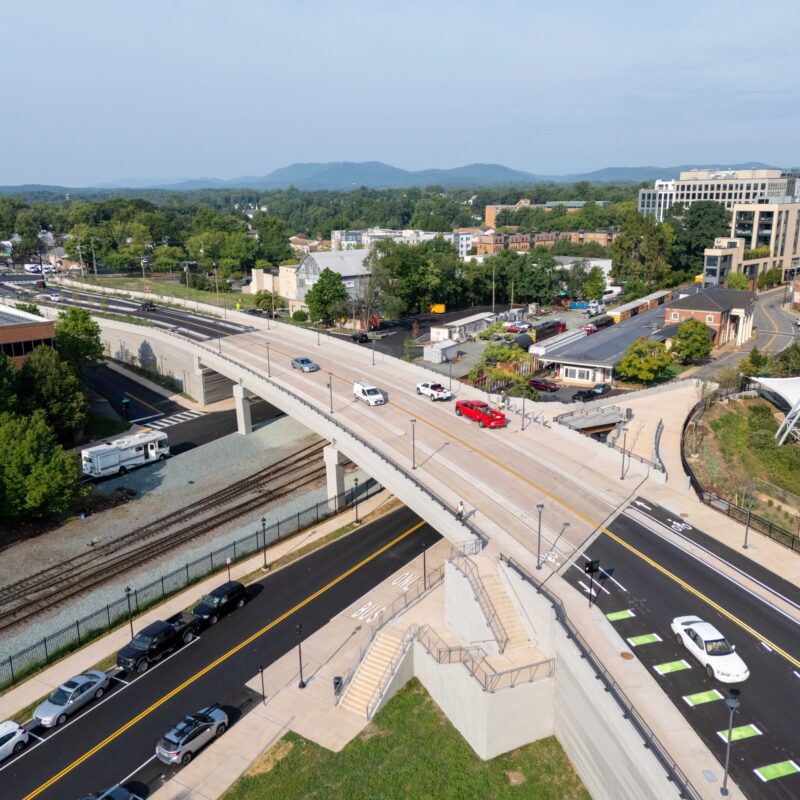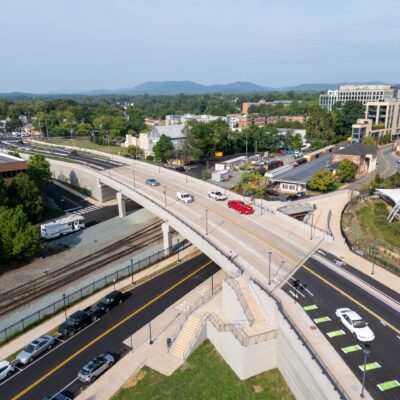On October 29, close to 100 people showed up to a public hearing on the design of the 250 Bypass Interchange for McIntire Road and voiced their opinion.
At the last City Council meeting, City Transportation Planner Jeanette Janiczek reported findings to Council and listed the steps needed for the design to get official approval.
|
The design for the 250 Bypass Interchange at McIntire Road still needs a few tweaks. City Council expressed the need of more pederstrian and bike friendly trails to the project. Councilor Holly Edwards had only one request: “Design matters.” Most residents are concerned about traffic and the impact the project will have on McIntire Park. |
According to staff reports, City Council will have to approve the major design features while allowing city staff to communicate with impacted homeowners. VDOT, then, will begin to collect right-of-ways for the construction of the controversial interchange. After right-of-ways are obtained, City Council will have to advertise bids for construction and finally choose the winning bid.
The construction of the Meadowcreek Parkway has been divided into three separate projects: a road in Albemarle County between Rio to Melbourne roads—Meadowcreek Parkway; a city portion planned through McIntire Park—McIntire Extended; and the final portion—the 250 Interchange. Originally, in 2005 the federal government under then U.S. Senator John Warner spawned the project with a $27-million earmark.
The design that was chosen is the G1 Alternative, which includes a signalized diamond and features the smallest ramp configuration. The current design has been modified to reflect, to some degree, the concerns of the community and of Council—mostly concerning the impact the project will have on McIntire Park and surrounding areas.
Mayor Dave Norris, who said that he will vote against the project, was still concerned with the rescue squad exit, which, as it is now designed, will force each ambulance to back track to McIntire Road.
Colette Hall, president of the North Downtown Residents Association, has been a vocal opponent of the project since its conception. In addition to concerns about the destruction of portions of McIntire Park, Hall says that her neighborhood will inevitably suffer from cut-through traffic. “I have righteous anger towards this,” she told C-VILLE. Although she is certain that the interchange will be built, Hall laments the lack of involvement of residents of North Downtown. “When we, the residents, wrote our comprehensive plan for the area in 2005, we said that if the interchange is built, there are a few things we want,” she says. “But we weren’t heard. It will change the character of the neighborhood.”
Janiczek said that most of the public concerns with this design have been the lack of bike and pedestrian friendly trails and facilities. Councilors Satyendra Huja and Julian Taliaferro said they preferred to have bike paths on both sides of the road.
Originally, a pedestrian bridge was included in the design. Ric Barrick, city spokesperson, says that the bridge was eliminated by the engineering firms after it received comments from the City Council. It was mostly a “cost-cutting” measure. The interchange is estimated to cost $30.5 million in federal and state funding and additional funding.
“The most expensive add would be the bridge, the ped and bike lanes are problematic due to the various needs of the design but are certainly possible,” said Barrick in an e-mail.
City Council will pick up the amended interchange design at their next meeting on December 7.
C-VILLE welcomes news tips from readers. Send them to news@c-ville.com.






